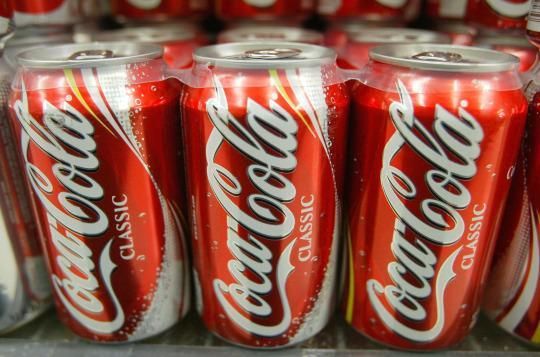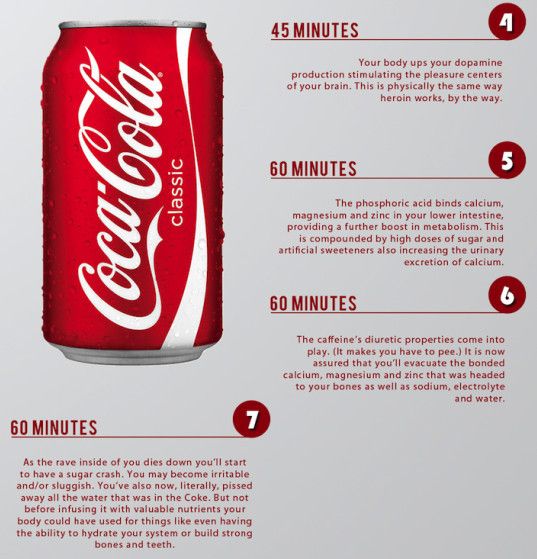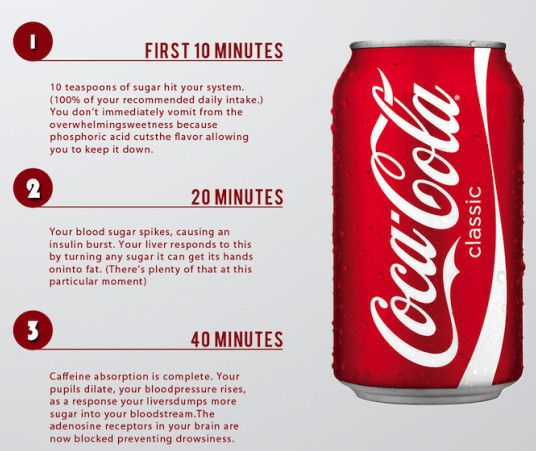What One Can of Coke Does to Your Body in Only One Hour
Writer: Korin Miller; July 29, 2015

It's pretty eye opening. (Photo: Getty Images)
"Soda is a health food!" said no one, ever (well, in the past 20 years, at least). So it hardly comes as a surprise that drinking soda can have a negative impact on your body.
But while most of us know soda isn't good for us, we also don't know exactly what happens to our bodies once we drink it. A detailed new infographic fromTheRenegadePharmacist.com breaks it down, step by step — and it's not pretty.
Here's what happens after you drink a Coke:
In the first 10 minutes: Ten teaspoons of sugar (100 percent of your recommended daily intake) hits your system.
In 20 minutes: Your blood sugar spikes and causes a burst of insulin. Your liver responds by turning the sugar it comes into contact with into fat.
In 40 minutes: Your body has absorbed the soda's caffeine. Your pupils may dilate, your blood pressure rises, and your liver "dumps more sugar into your bloodstream." The adenosine receptors in your brain are blocked to prevent you from feeling drowsy.

In 45 minutes: Your body increases production of the pleasure neurotransmitter dopamine.
In 60 minutes: The soda's phosphoric acid binds with calcium, magnesium, and zinc in your lower intestine to give you a further boost in metabolism. This is intensified by the high doses of sugar and artificial sweeteners that also cause you to urinate out calcium.
After 60 minutes: The caffeine's diuretic effect makes you have to pee. When you do, you'll pass on the bonded calcium, magnesium, and zinc that were headed to your bones, as well as sodium, electrolytes, and water.
Then a sugar crash begins, and you may become irritable and sluggish. You've now urinated out all of the water that was in the Coke, along with the nutrients that the phosphoric acid bonded to in your body that would have hydrated you or gone on to build strong bones and teeth.
Registered dietitian-nutritionist Karen Ansel, co-author ofThe Calendar Diet: A Month by Month Guide to Losing Weight While Living Your Life, tells Yahoo Health that the infographic highlights some of the concerns with drinking soda on a regular basis. But, she adds, some of the effects of caffeine from soda listed in the infographic "are a bit of an exaggeration" unless a person is sensitive to caffeine — especially since a can of soda typically contains less than a fifth of what you'd get from a 12 ounce Starbucks coffee.
"However, cola has been shown to weaken bones and teeth, so it is on target there," she says.
But Kristin Kirkpatrick, a registered dietitian at the Cleveland Clinic, tells Yahoo Health that the impact of soda on your bones and teeth is tied more to regularly drinking the fizzy stuff. "Studies show that calcium excretion affects bone health over time," she says. "It's not just, 'OK, I'm going to have a Coke, and I hope I don't break my leg."
Related: This Is What Happens When You Drink 10 Cans of Soda Per Day for One Month
Nearly 25 percent of Americans drink soda on a regular basis, according to data collected by the Centers for Disease Control and Prevention, and both experts say that's a problem.
It's mainly due to all of the sugar: A can of soda can contain 3 tablespoons of sugar, and a 12-ounce bottle of the drink has more than 4 tablespoons.
"When you drink soda, its sugar literally floods your system, quickly raising blood sugar levels," Ansel says. That's problematic because your body needs to kick into overdrive to try to convert all of that sugar into energy — and the excess is stored in your body as fat.
Soda also contributes to weight gain because our brains don't feel full from the liquid calories the same way they do after we eat solid foods, says Ansel. As a result, it's easy to drink a lot of empty calories without realizing it.
But drinking soda doesn't just impact your waistline. A 2013 study that was published in the journal Diabetologia found that study participants who drank one 12-ounce soda a day were at a greater risk of developing Type 2 diabetes.
Related: Coke Makes Push to Market Sugary Soda as Healthy Snack
Another study, published in the journal Cancer Epidemiology Biomarkers Prevention in 2010, found that regular soda drinkers (those who had two or more sodas a week) were 87 percent more likely to develop pancreatic cancer.
Ansel says having a soda on rare occasions isn't a huge deal, but she recommends having as little as possible by filling your cup with ice first or pouring it into a small glass, rather than drinking straight from the bottle or can.
Adds Kirkpatrick: "Should you worry if you're the healthiest person in the world and you have one can of Coke on vacation? Not really. Just don't do it on a regular basis."
www.keralites.net        |
Posted by: Pramod Agrawal <pka_ur@yahoo.com>
| Reply via web post | • | Reply to sender | • | Reply to group | • | Start a New Topic | • | Messages in this topic (1) |
To subscribe send a mail to Keralites-subscribe@yahoogroups.com.
Send your posts to Keralites@yahoogroups.com.
Send your suggestions to Keralites-owner@yahoogroups.com.
To unsubscribe send a mail to Keralites-unsubscribe@yahoogroups.com.
Homepage: http://www.keralites.net


No comments:
Post a Comment